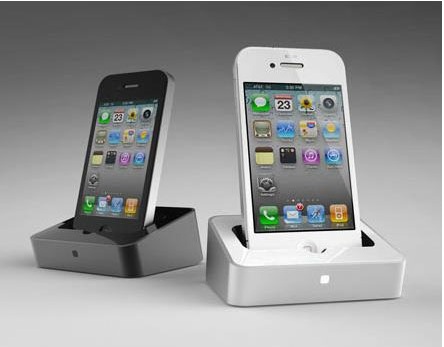This story was contributed by Charles Luzar of Crowdfund Insider.
[aditude-amp id="flyingcarpet" targeting='{"env":"staging","page_type":"article","post_id":576716,"post_type":"guest","post_chan":"none","tags":null,"ai":false,"category":"none","all_categories":"business,mobile,","session":"C"}']Today Lumawake launched a crowdfunding campaign for its revolutionary iPhone dock. The company’s approach may provide insight into how future product designers should consider approaching crowdfunding.
Lumawake Features
AI Weekly
The must-read newsletter for AI and Big Data industry written by Khari Johnson, Kyle Wiggers, and Seth Colaner.
Included with VentureBeat Insider and VentureBeat VIP memberships.
Lumawake is an iPhone dock that does much more than just charge your phone. It uses a passive infrared sensor (PIR) to detect movement during sleep and wakes you at the optimal time in your sleep cycle, providing a welcome respite from the typical timed alarm clock. The dock has LEDs that gradually get brighter in the morning, helping you wake naturally and feel less groggy.
Lumawake is also integrated with the latest home automation systems to trigger events in your home based on your behavior. For example, it can start a pot of coffee the moment you wake or turn the TV off automatically once you’ve fallen asleep. Lumawake’s open API also lets developers adapt the product in new ways in the future.
If you’re used to fumbling around in the dark for your charger, you’ll also be happy to know it automatically lights up when you go to set your phone in the dock. Sometimes it’s the little things.
The Birth of Lumawake
Lumawake co-founder Greg Laugle came up with the idea in 1997. “I was working my way through college, and I was so busy all the time that I barely got any sleep, and I absolutely loathed my alarm clock.” Greg imagined an alarm clock that monitored brainwaves to determine sleep state, but the technology at the time was cost-prohibitive and would require probes in the scalp. It went on the back burner.
In 2004, Greg revisited the idea and began compiling further research on sleep state. “The eureka moment was when I hit upon the fact that there’s a very noticeable and easy-to-measure difference between light and deep sleep, which is simply the fact that when you’re in deep sleep, you are motionless, while when you are in light sleep, you will be moving around and rolling over and such.”
[aditude-amp id="medium1" targeting='{"env":"staging","page_type":"article","post_id":576716,"post_type":"guest","post_chan":"none","tags":null,"ai":false,"category":"none","all_categories":"business,mobile,","session":"C"}']
Then in 2009, Greg began exploring iPhone development with his colleague Drew Shepard, who is now the co-founder of Lumawake. The two engineers began to imagine an iPhone dock that capitalized on the research Greg had done on sleep. The Lumawake was born and has been in the works since.
The Launch That Never Was
From the beginning the Lumawake team had planned on leveraging the popular Kickstarter crowdfunding platform to solicit preorders for their new product. However, Kickstarter has been less willing to accept crowdfunding campaigns for new products amidst the difficulties of some other campaigns of this type, most notably the Pebble watch.
Pebble famously raised over $10 million for its e-paper watch but then experienced shipping delays that have frustrated its funders. This led to Kickstarter’s “We Are Not a Store” blog post and to its subsequent policy change, making requirements for product launches more stringent.
Lumawake was rejected from Kickstarter twice. Chief Outreach Officer Scott Roehrick didn’t forsee the problem. He said, “When they made changes to their project guidelines, we delayed our launch by a month and polished the prototypes to make sure the new criteria were met. We saw it as a speed bump but nothing another month of work couldn’t solve. Submitting our project plan seemed like a formality. We never even considered that we would be denied.”
[aditude-amp id="medium2" targeting='{"env":"staging","page_type":"article","post_id":576716,"post_type":"guest","post_chan":"none","tags":null,"ai":false,"category":"none","all_categories":"business,mobile,","session":"C"}']
Launching With Selfstarter
After the second rejection, the Lumawake team went back to the drawing board. They needed a new way to solicit contributions if they were to crowdfund their upcoming product launch. This is when they discovered Selfstarter, a white-label crowdfunding platform recently open-sourced by Lockitron. Lockitron famously used the platform to successfully raise over $2 million for its iPhone-synced door lock. The codebase it used to execute the campaign is now available for free on GitHub, enabling anyone to “roll your own crowdfunding.”
Selfstarter also provides peace of mind for backers. Backers won’t be charged until the product ships, which should alleviate concerns regarding contributors not receiving product. Backers can contribute to essentially reserve their piece of hardware, and the Lumawake team is rewarded with insight into market size and crowd response. To start the ball rolling, Lumawake will use funds from the pre-order as leverage to secure funding from another source.
With the stringent requirements Kickstarter has put in place for product designers, Lumawake’s experience can help future product crowdfunders avoid some of the same pitfalls. In regards to Kickstarter, Scott said, “They are learning from failures on their platform but by definition are marginalizing themselves when it comes to technology projects. It’s a deliberate change in focus and I don’t think is something they’re making any apologies for. There’s going to be a massive shift to fill this void that is only beginning. We’re excited to help pave the way.”
A version of this story appeared today on Crowdfund Insider.
[aditude-amp id="medium3" targeting='{"env":"staging","page_type":"article","post_id":576716,"post_type":"guest","post_chan":"none","tags":null,"ai":false,"category":"none","all_categories":"business,mobile,","session":"C"}']
VentureBeat's mission is to be a digital town square for technical decision-makers to gain knowledge about transformative enterprise technology and transact. Learn More
